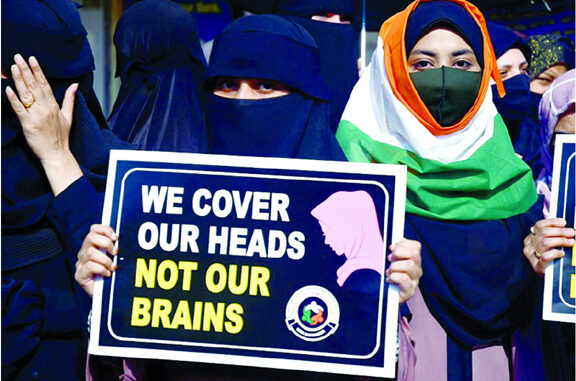
New Delhi (TIP)- The Supreme Court on Thursday, October 13, delivered a split verdict on the hijab ban in Karnataka’s educational institutions, with one judge holding permitting a community to wear its religious symbols would be an “antithesis to secularism” and the other insisting that wearing the Muslim headscarf should be simply a “matter of choice”.
While Justice Hemant Gupta dismissed the appeals challenging the March 15 judgment of the Karnataka High Court that had refused to lift the ban, Justice Sudhanshu Dhulia held there shall be no restriction on the wearing of hijab anywhere in the schools and colleges of the state. With the apex court delivering a split verdict, the high court’s judgment still holds the field. However, the split verdict held off a permanent resolution of the vexed row over hijab as both judges suggested placing the matter before a larger Bench for adjudication. Writing a separate 73-page judgment, Justice Dhulia said, “By asking the girls to take off their hijab before they enter the school gates is first an invasion of their privacy, then it is an attack on their dignity, and then ultimately it is a denial to them of secular education.”
Justice Gupta, who was heading the Bench and wrote a contrary verdict running into 133-pages, answered the 11 questions framed by him for consideration in the matter and said the constitutional goal of fraternity will be defeated if the students were permitted to carry their apparent religious symbols with them to the classroom. While pronouncing the judgment on a batch of 26 petitions, Justice Gupta said at the outset, “In view of the divergent views expressed by the Bench, the matter be placed before the Chief Justice of India for constitution of an appropriate Bench.”
In his verdict, Justice Gupta said the arguments advanced by the counsel for some of the appellants that this matter involved a substantial question of law and should be referred to a five-judge Bench was “not tenable”. Both the judges referred to the state government’s February 5, 2022, order which banned wearing clothes that disturbed equality, integrity and public order in schools and colleges.
Justice Gupta noted the government order “promotes an equal environment”. “Accordingly, I do not find that the government order impinges on the constitutional promise of fraternity and dignity. Instead, it promotes an equal environment where such fraternal values can be imbibed and nurtured without any hindrance of any kind,” he said. On the other hand, Justice Dhulia set aside the high court verdict and also quashed the government order. “Under our constitutional scheme, wearing a hijab should be simply a matter of choice. It may or may not be a matter of essential religious practice, but it still is, a matter of conscience, belief, and expression,” he said.
Justice Dhulia further said the “unfortunate fallout of the hijab restriction would be that we would have denied education to a girl child”. He said in his opinion, courts were not the forums to solve “theological questions”. He said the courts, however, must interfere when the boundaries set by the Constitution were broken or where unjustified restrictions were imposed.
Justice Gupta noted that some of the appellants had also made a comparison with the rights of the followers of the Sikh faith by arguing that since ‘kirpan’ was allowed in terms of Explanation I to Article 25, therefore, the students who wanted to wear hijab should be equally protected. “The essential religious practices of the followers of Sikh faith cannot be made basis of wearing of hijab/headscarf by the believers of Islamic faith,” Justice Gupta said. “As discussed above, secularism is applicable to all citizen,” he said. Source: PTI




Be the first to comment